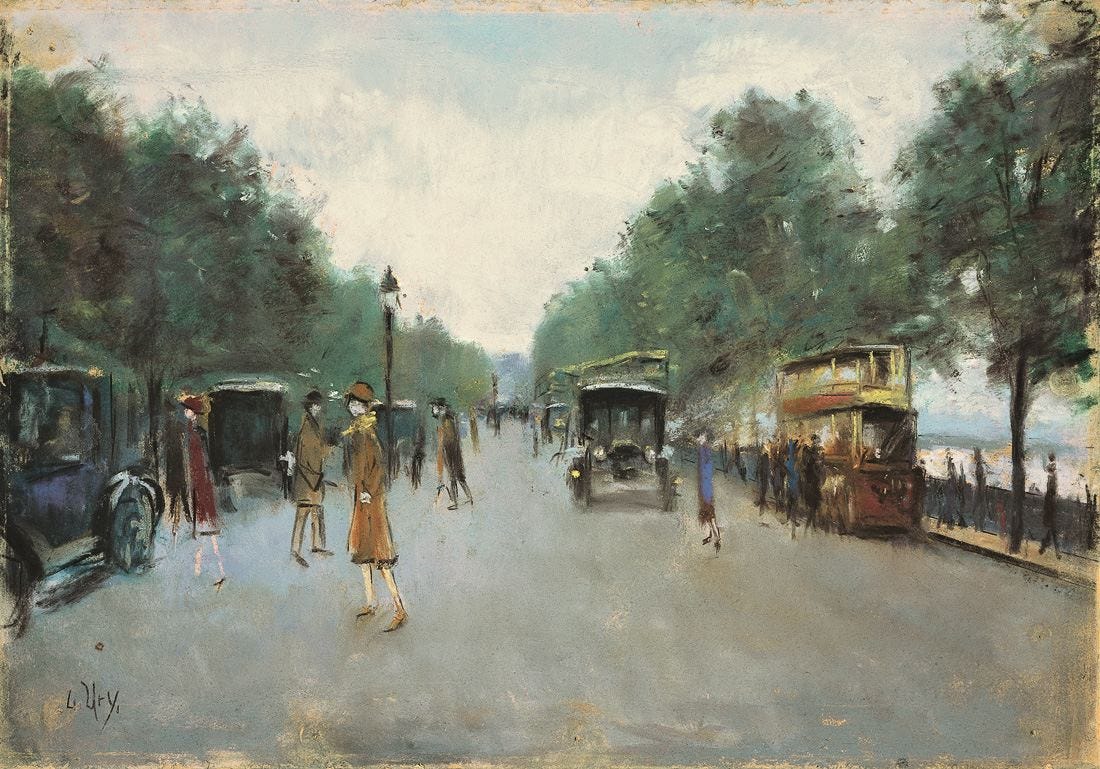
Disobedience
by A.A. Milne
James James Morrison Morrison Weatherby George Dupree Took great Care of his Mother, Though he was only three. James James Said to his Mother, “Mother,” he said, said he; “You must never go down to the end of the town, if you don’t go down with me.” James James Morrison’s Mother Put on a golden gown. James James Morrison’s Mother Drove to the end of the town. James James Morrison’s Mother Said to herself, said she: “I can get right down to the end of the town and be back in time for tea.” King John Put up a notice, “LOST or STOLEN or STRAYED! JAMES JAMES MORRISON’S MOTHER SEEMS TO HAVE BEEN MISLAID. LAST SEEN WANDERING VAGUELY: QUITE OF HER OWN ACCORD, SHE TRIED TO GET DOWN TO THE END OF THE TOWN — FORTY SHILLINGS REWARD!” James James Morrison Morrison (Commonly known as Jim) Told his Other relations Not to go blaming him. James James Said to his Mother, “Mother,” he said, said he: “You must never go down to the end of the town without consulting me.” James James Morrison’s mother Hasn’t been heard of since. King John said he was sorry, So did the Queen and Prince. King John (Somebody told me) Said to a man he knew: “If people go down to the end of the town, well, what can anyone do?” (Now then, very softly) J.J. M.M. W.G. Du P. Took great C/O his M***** Though he was only 3. J.J. said to his M***** “M*****,” he said, said he: “You-must-never-go-down-to-the-end-of-the-town- if-you-don’t-go-down-with-ME!” ═════════════════════════
(Just over a year ago, in the first weeks of Poems Ancient and Modern, we presented to our small initial audience several poems that seem worth reviving for the larger number of readers the newsletter has now. And so, in the coming weeks, we will be revisting a few of those poems from our archive. For Today’s Poem, we take a look again at A.A. Milne.)
A.A. Milne (1882–1956) needs no introduction. If anything, he needs a disintroduction. His Winnie the Pooh books are so well known that they intrude in our vision like rainbow glasses that make everything by the man seem giddy and gooey. The truth is that Milne was very good at writing children’s books, and what we need is to cast aside the lenses that popular success (aided by Disney) has taught us to use when reading the man. We need to start over, reading Milne afresh.
Take, for example, the poem “Disobedience” in his 1924 collection When We Were Very Young. As in much good children’s verse, there’s a something in the poem for children and something for adults. The joke that children love is simply that the disobedient one is not the child but the mother. Despite the orders of her responsible three-year-old son, telling her not to go down to the end of the town, the willful adult disobeys. Off she goes and is promptly lost.
The adult joke is more complicated. Of all the poetic eras in English, it was the Victorian age that made the most concerted attempt to import into English the classical meters of Ancient Greek and Latin. The difficulty is that classical meters run on what’s called quantity, the long and short length of vowels, while natural English meters run on accentual stress, the ictus that makes us pronounce, say, “vapid, mushy, sloppy goo” as VÀPid, MÙSHy, SLÒPpy GÒO. And the two systems of prosody don’t go together naturally.
The best-sounding solution is to line up the stresses and the long vowels — which has as high a degree of difficulty as anything in English poetry. Another solution, however, is just to ignore the quantity, recreating such classical forms as hexameters with stresses instead of vowel lengths. And that’s the technique the later A.A. Milne uses in his 1920s “Disobedience,” replacing the spondees (long-long) and dactyls (long-short-short) of Latin with the spondees (STRONG-STRONG) and dactyls (STRONG-weak-weak) of English in his hexameter lines.
Which is, you have to say, a peculiar thing to do when writing a children’s poem. But there we are. That’s the joke for adults: JÀMES JÀMES / MÒR-ri-son / MÒR-ri-son / WÈATH-er-by / GÈORGE du- / PRÈE gives us the six feet of a reasonable approximation of classical hexameter — but in stresses rather than vowel length.
The stanzas are each printed with ten lines, and the first eight form three lines of hexameter: two of them printed in three lines, and the third in two. Lines 9 and 10 (whose printed line-break varies) form a more conventional comic rhythm: “I can GÈT right DÒWN to the ÈND of the TÒWN and be BÀCK in TÌME for TÈA.”
It’s those last lines that remind us that Milne’s hexameters hide not only under the many line breaks but also under what we hear as a ballad meter: four-stress lines alternating with three-foot lines, rhymed on the short lines, as though it were
JÀMES / JÀMES / MÒRrison / MÒRrison
WÈATHerby / GÈORGE Du- / PRÈE.
TÒOK / GRÈAT / CÀRE of his / MÒTHer,
THÒUGH / he was / ÒNly / THRÈE.
The kids won’t get it. These days, few adults will get it. But the joke is nonetheless present, turning a schoolboy exercise into a sing-songy triumph








My mother loved this poem, recited it all the time, whispers and all (one of the few she did recite), and it was probably the first poem I memorized too. Thank you.
Delightful and instructive. Although we say we replace quantity with accent, quantity is undoubtedly a primary factor in metrical composition. For example, no one would think that "handed" and "handshake" are metrically equivalent.
Derek Attridge, the discoverer of the implied offbeat, took this poem as the subject of a substantial article titled "Rhythm in English Poetry," published in New Literary History in Autumn 1990, Vol. 21, No. 4. Available on JSTOR.